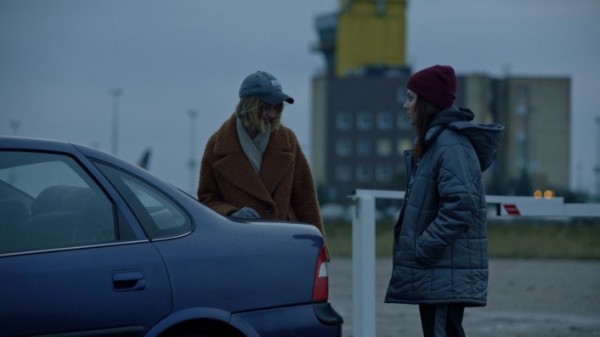-
PILGRIMS (Laurynas Bareia (2021)
LAURYNAS BAREIŠA: PILGRIMS (2021)

Revisiting the sites associated with a brother's murder exposes the moral weakness of a town
Bareiša won the Orizzonti Award for Best Film for Pilgrims at the 2021 Venice Film Festival. It must have appealed to jurors because of its chilly, unyielding - but assured - presentation. It is a relentlessly unfun and rather creepy work and not altogether understandable, avoiding easy exposition, even at first of basics.
Two people, a man and woman, go on a tour (the title "pilgrims" is odd) of sites associated with a brutal kidnapping and murder, that of the brother of one of them four years earlier. The plan is to visit all the locations the victim was known to be at on the night of the murder, leading up to it. The "pilgrims," if you will, are Indre (Gabija Bargailaite), whose boyfriend, Matas, was killed, and Paulius (Giedrius Kiela), who was his brother. As they do this, they encounter a mixture of indifference and hostility. The general response sometimes is, We dealt with this properly at the time, we want to hear no more about it. Others simply seem to have forgotten about it.
Some call this a "thriller," others a "horror movie." It is certainly not a mystery; the wrongdoer has already been brought to justice. Probably it is not quite the other two either; its steering just this side of any specific categories could be another part of the appeal to jurors. The setups of scenes are cool, the images clear and bright. Long takes, pauses. No score.
The crime being revisited involves a car. At one point Paulius obtains the car (Indre has begun seeming to think him a nut case) to reenact the moment of the act more vividly.
Nikola Jovic, who considers this film thoughtfully in his review for Eye on Film, explains that "early on" it becomes clear that this "isn’t simply a tale about a particular incident," but much more "a story about a whole town subsumed by this veil of moral bankruptcy." Somehow perhaps many of the local inhabitants are participants in the crime, if not by commission, by omission, by silence or indifference or lack of sympathy. Jovic seems to think the development of this theme gets sidetracked somehow, but he still admires the film.
Jonathan Romnney has a slightly more detailed description of the film in Screen Daily, noting likewise that the townspeople "close ranks, objecting to the pair’s investigation, apparently friendly and helpful one moment, hostile the next," and he adds that "What’s also upsetting is the sense that somehow violence is a part of the fabric of normal life, only thinly hidden under the surface of the everyday." He points out that one person shows Paulius a site of wartime atrocities. Enough said? Ultimately the focus isn't on a kind of therapy or bonding with the victim by Paulius and Indre so much as on a seeping guilt, a human lack of redemption or redeemable-ness. If the film works its chilly magic on you, it may leave you with a stunned sense of new troubling awareness. But doesn't Bareiša's accomplished film become possessed of the very ills it seeks to decribe?
Pilgrims/Pilgrimai, 92 mins., in Lithuanian, debuted at Venice Sept 6, 2021, and showed at Vienna, Thessaloniki, Tailinn and Göteborg. Included in the FLC-MoMA New Directors/New Films series (Apr. 20-May 1, 2022).
Last edited by Chris Knipp; 04-19-2022 at 12:40 AM.
 Posting Permissions
Posting Permissions
- You may not post new threads
- You may not post replies
- You may not post attachments
- You may not edit your posts
-
Forum Rules





 Reply With Quote
Reply With Quote
Bookmarks